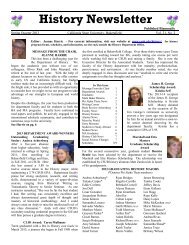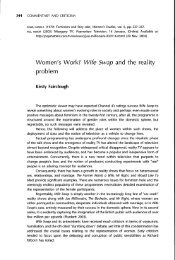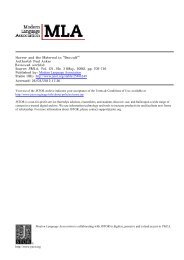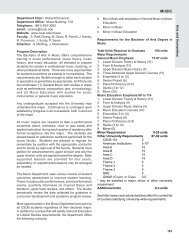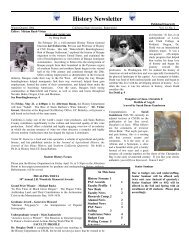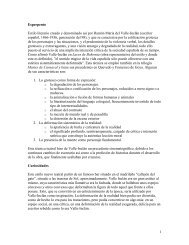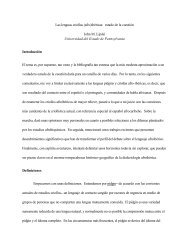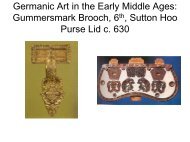''Don't Ask me, I'm Just a Girl'': Feminism, Female Identity, and The ...
''Don't Ask me, I'm Just a Girl'': Feminism, Female Identity, and The ...
''Don't Ask me, I'm Just a Girl'': Feminism, Female Identity, and The ...
You also want an ePaper? Increase the reach of your titles
YUMPU automatically turns print PDFs into web optimized ePapers that Google loves.
Don’t <strong>Ask</strong> <strong>me</strong>, I’m <strong>Just</strong> a Girl 279<br />
traditional-minded show, one that not only embraces ‘‘family values’’<br />
more deeply than many of the politicians who so vocally tout them,<br />
but also defines the term in a much more authentic way, for on <strong>The</strong><br />
Simpsons ‘‘family values’’ most often <strong>me</strong>ans mutual respect <strong>and</strong> deep<br />
compassion for the other <strong>me</strong>mbers of the family unit. In the two<br />
episodes discussed here, we see that neither Ho<strong>me</strong>r nor Marge is willing<br />
to sacrifice the love of the other nor of the family they have<br />
developed; instead, they choose to remain together <strong>and</strong> work through<br />
their differences, <strong>and</strong> this has been a sustained the<strong>me</strong> throughout the<br />
entire run of the show. <strong>The</strong> situations in both ‘‘Ho<strong>me</strong>r’s Night Out’’<br />
<strong>and</strong> ‘‘Life on the Fast Lane’’ are a reminder of how, from the very start,<br />
<strong>The</strong> Simpsons has engaged gender politics to explore issues that are<br />
important to the adult viewing audience, both male <strong>and</strong> female.<br />
Selma Bouvier <strong>and</strong> the Politics of ‘‘Choice’’<br />
Motherhood, which is a topic of special concern to female viewers, is<br />
continually dealt with on <strong>The</strong> Simpsons, although often in generic or<br />
tangential ways. However, in ‘‘Selma’s Choice’’ (#9F11), an episode<br />
from Season Four, the subject of motherhood <strong>and</strong> the highly politicized<br />
issues that surround it are intimately explored. At the beginning of<br />
this episode, Marge Simpson <strong>and</strong> Selma <strong>and</strong> Patty Bouvier (Marge’s<br />
twin sisters) are preparing for the funeral of their Aunt Gladys, a<br />
woman who ‘‘lived alone, died alone.’’ In the videotaped will that<br />
Gladys left for the family, she encourages her childless nieces to raise a<br />
family before its too late: ‘‘Don’t die lonely like <strong>me</strong>,’’ she advises them.<br />
‘‘Do it now!’’ With an almost cruel irony, Gladys leaves the twin sisters<br />
her gr<strong>and</strong>father clock, which we hear ticking loudly in the backseat of<br />
the car as the Simpson clan drives ho<strong>me</strong>, a reminder—to the sisters, as<br />
well as viewers of <strong>The</strong> Simpsons—of a woman’s so-called ‘‘biological<br />
clock.’’ Of the two sisters, only Selma, always the more senti<strong>me</strong>ntal of<br />
the twin sisters, seems bothered by the fact that she is both single <strong>and</strong><br />
childless. To regular viewers of the show, this is not surprising: Selma’s<br />
desires for both a loving partner <strong>and</strong> children were first made evident in<br />
‘‘Principle Charming’’ (#7F16), an episode from Season Two. In this<br />
episode, Selma is feeling a sense of ‘‘emptiness’’ in her life, <strong>and</strong> she<br />
expects that love can fill this void. Marge, naturally concerned, challenges<br />
Ho<strong>me</strong>r to help find Selma a man. Notably, within the episode,



